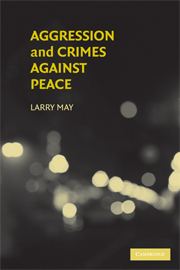Book contents
- Frontmatter
- Contents
- Acknowledgments
- PART A PACIFISM AND JUST WARS
- PART B RETHINKING THE NORMATIVE AD BELLUM PRINCIPLES
- PART C THE PRECEDENT OF NUREMBERG
- PART D CONCEPTUALIZING THE CRIME OF AGGRESSION
- PART E HARD CASES AND CONCLUDING THOUGHTS
- 13 Humanitarian Intervention
- 14 Terrorist Aggression
- 15 Defending International Criminal Trials for Aggression
- Bibliography
- Index
15 - Defending International Criminal Trials for Aggression
Published online by Cambridge University Press: 13 November 2009
- Frontmatter
- Contents
- Acknowledgments
- PART A PACIFISM AND JUST WARS
- PART B RETHINKING THE NORMATIVE AD BELLUM PRINCIPLES
- PART C THE PRECEDENT OF NUREMBERG
- PART D CONCEPTUALIZING THE CRIME OF AGGRESSION
- PART E HARD CASES AND CONCLUDING THOUGHTS
- 13 Humanitarian Intervention
- 14 Terrorist Aggression
- 15 Defending International Criminal Trials for Aggression
- Bibliography
- Index
Summary
International criminal law is under assault from both realists and communitarians. International law generally is often portrayed as a pipe dream at best and a dangerous distraction at worst. Such criticisms will have an effect on whether there are to be international trials for the crime of aggression. To defend international criminal trials diverse authors have proposed various normative rationales: some proposing deterrence, some proposing retribution, and others proposing truth and reconciliation. Yet each of these theories has been shown to fall short of defending the entirety of international criminal law. In this final chapter, I will provide a limited defense of international criminal trials conducted in a neutral locale such as The Hague, not by reference to a single normative principle, such as deterrence or retribution or truth and reconciliation, but by reference to a combination of principles applicable differently for different contexts. I do not claim that the sum of these defenses is larger than its parts but only that it may be possible to construct a partial defense on the basis of each that overlaps sufficiently to justify most of international criminal law.
Throughout this book and the two previous books I have written on the moral foundations of international criminal law, I have also voiced many criticisms of the movement toward the increasing use of criminal trials at the international level. But I have nonetheless tried to construct a limited defense of these trials. Most of this defense is normative, as this chapter will rehearse.
- Type
- Chapter
- Information
- Aggression and Crimes Against Peace , pp. 319 - 342Publisher: Cambridge University PressPrint publication year: 2008



